15 Insanely Fun Peer-to-peer Recognition Ideas That Sparks Joy
The power of social validation is often swept under the rug because it's uncomfortable to acknowledge just how much we thrive on appreciation. But honestly, it shouldn't be. We are a "pack animal." We need acceptance, support, and connection— albeit how much (that will differ from person to person)— to live a life that can be termed fulfilling.
The same idea applies to the workplace in that if you want to foster a culture that is warm, welcoming, and retains people for the long term, you simply can't undermine the importance of peer-to-peer recognition ideas.
But first:
What Is Peer-to-peer Recognition?

Peer-to-peer recognition is when colleagues show appreciation and acknowledge each other's contributions and hard work. Think of it as a high-five from a coworker or a job well done! It's a fun and simple way to spread positivity and motivation in the workplace.
Imagine this: you're having a tough day at work. Maybe you missed a deadline or made a mistake on a project. Suddenly, you receive a notification on your computer that someone on your team has recognized you for your hard work on a different task. The recognition may be small, but the impact is huge. You feel seen, appreciated, and motivated to keep pushing forward.
Here's something interesting to ponder.
Symantec found a 14% increase in engagement scores based on their social recognition program.
But it's not just about individual recognition. Peer recognition programs also help to build a sense of community and collaboration within a team.
When employees are encouraged to recognize their peers, they start to perceive one another as important players in the success of the team. This leads to a more supportive and cohesive work environment, where everyone feels like they are working towards a common goal.
Can Peer Recognition Be As Effective As A Pay Raise?
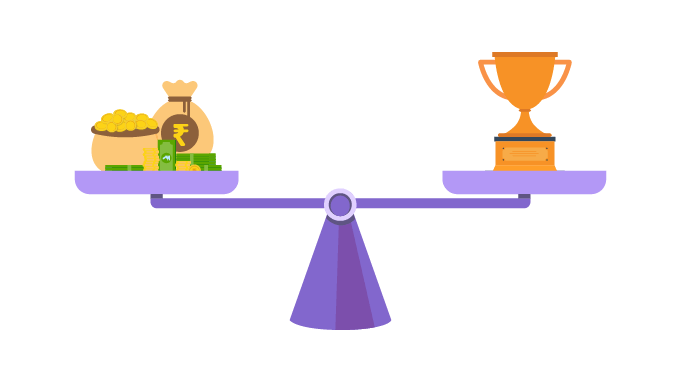
Pay raises are always going to be big reasons why a top talent accepts or leaves a job. That being said, discounting the importance of peer relationships and the humane connection is not a wise thing to do.
Here's what a Harvard Business Review article had to say about the impact of peer praise at work:
Our hypothesis is that if a company gives a pay increase, the engagement bump is short-lived, as the new income level becomes the mental norm — necessitating another raise later to maintain the same level of engagement.
Meanwhile, a 2019 report by The Institute of Leadership and Management found that:
77% of respondents rated "building close relationships with colleagues" as the most important factor in determining job satisfaction.
Think of building a team like baking a cake. Sure, you can throw in all the ingredients, but without love and appreciation, the final product might be lacking. If you want a team that crushes goals and sticks together, adding a pinch of peer recognition to the mix is key!
When you focus on salaries alone, you might end up with a team that gets the job done. But when you sprinkle in a culture of appreciation, you'll bake a team that not only crushes their goals but also stays committed for the long haul!
Top 15 Peer-to-peer Recognition Ideas That Really Work Wonders
Peer-to-peer recognition is the secret ingredient that can take your workplace from good to great! Get ready to say goodbye to bland, boring workdays and hello to a culture of motivation and positivity. So grab a cup of your favorite beverage, and let's dive into some exciting ideas for peer-to-peer recognition!
1. Dedicated Celebration Calendar

The Idea
Calendars are quite a handy— yet dreaded— reminders of all the tasks that are piling up on your workload. However, this very calendar can prove to be a small yet albeit powerful way to change how you encourage peer-to-peer recognition.
The idea is simple. A celebration calendar lists down the days when you and your team can bond over a simple joy, such as sharing a pizza on National Pizza Day.
If You Are An HR Manager
If you are an HR, a manager, or even a team leader, here is how you make the most out of the Celebration Calendar:
- First and foremost, have a list of dedicated employee-oriented days that have the
- Secondly, the Celebration Calendar needs to be dynamic. Had an employee made a significant contribution to the project? Plan a day (or even just a 5-minute break) simply to honor them!
- Thirdly, don't discount any "fun" days as useless. Say, it's National Ice-Cream Day. Have an ice cream truck come in during the day and watch your employees reminisce and bond over their favorite ice cream flavors. Sometimes engaging your people is really that easy.
If You Are An Employee
The Celebration Calendar is all about finding small moments to thank the people who make our lives easier.
So, for the next National Coffee Day, get your closest colleagues their favorite coffee on National Coffee Day to thank them for sticking by your side. Or on National Say Something Nice Day, you could also keep it simple by penning a thank-you note on a sticky note to someone who helped you meet your deadline more quickly.
2. Set Up A "Peer Bonus" System
The Idea
The Peer Bonus system is an incentivization process that shifts the emphasis away from top-down recognition and toward empowering the general crowd to notice and reward exceptional performance.
Quite frankly, this just might be the most impactful— and well-documented— idea on how to encourage employees to become more comfortable with receiving and giving more recognition in the workplace.
If corporate giants like Google and Zappos have already adopted this peer-to-peer recognition concept to enhance their already excellent company cultures, then any other company should consider it seriously.
If You Are An HR Manager
Any peer-recognition idea—no matter how full of dormant potential it may seem— is rarely the magic solution that it is marketed to be. In his presentation "5 Google Engineering Management Mistakes," Piaw Nai claimed:
Peer bonus structure was very well done, but not widely used inside engineering. It was also not integrated into the feedback/peer review structure for promotions.
So, developing a solid strategy is vital if you intend to deploy the peer-bonus system across the entire company. The plan should ideally focus on:
- Distribution system to support the delivery of the peer bonuses
- The budget allocation of the peer bonuses
- Policies to counteract the misuse of the peer bonus system.
If your organization attempts to design a peer bonus system by itself, it’s going to cost you an unnecessary amount of effort, time, and resources to get a decent working model. Moreover, if you are based in a global company, the overhead costs of designing and running such a program become astronomical (and frankly unnecessary) when you can instead opt for platforms like Vantage Rewards.
Vantage Rewards is an employee rewards and recognition platform that can empower your employees to recognize their peers for their achievements with ease, even if they are based in another part of the world.
With Vantage Rewards, HR managers can allocate a reward budget to each employee, empowering them to incentivize their team members whenever they see them going above and beyond. And the best part? It's all done seamlessly, making recognition effortless and fun!
To learn more about how you can bring this awesome feature to your organization, sign up for a free demo trial here.
If You Are An Employee
Giving peer bonuses to those we get along with better may seem tempting, but doing so might easily overshadow someone else's hard work. Just remember that power entails responsibility.
3. Snap Cups

The Idea
A Snap Cup can be a periodic team ritual in which each team member places a chit of paper in a cup, anonymously praising one of their peers. Afterward, during a team lunch or staff meeting, the manager reads out each employee's words of praise. At this point, everyone "snaps" their fingers to indicate that they did a great job.
If You Are An HR Manager
Powering through the Snap Cups session and turning such a simple team-building exercise into a team ritual will require the following:
- Make it periodic. Once a year is far too short a time to form strong peer connections. We recommend doing this activity once a month to really see the difference in how your team members treat one another.
- Take extra precautions to keep the names anonymous. Most people avoid expressing gratitude to others because it feels awkward to draw attention to themselves. An anonymous peer appreciation activity ensures that the focus remains on the person receiving the appreciation.
- Tap into the potential of this peer-appreciation activity by making the outcomes even more interesting. For the employee who is successful in obtaining the most accolades, offer a special award or incentive (ideally monetary). After all, receiving the team's admiration on its own merits a prize, doesn't it?
If You Are An Employee
When you get the option of putting down your words describing your peer, here is a list of appreciation messages for your coworkers that will help you to put meaning and thought behind your notes.
4. Huddle Up!
The Idea
Make an on-the-spot team huddle when someone does something outstanding to mark the achievement. Salute their accomplishment with a toast.
If You Are An HR Manager
Limit the huddle to a short and sweet 2 minutes at most. Share what the employee accomplished and why this milestone is important to the company. Share the impact of the milestone and highlight in detail how the employee has been pivotal in achieving that goal.
If You Are An Employee
Act as your team member's biggest cheerleader! Work might just be work for you, but cheering for someone else's efforts never goes in bad faith.
5. Service Yearbook
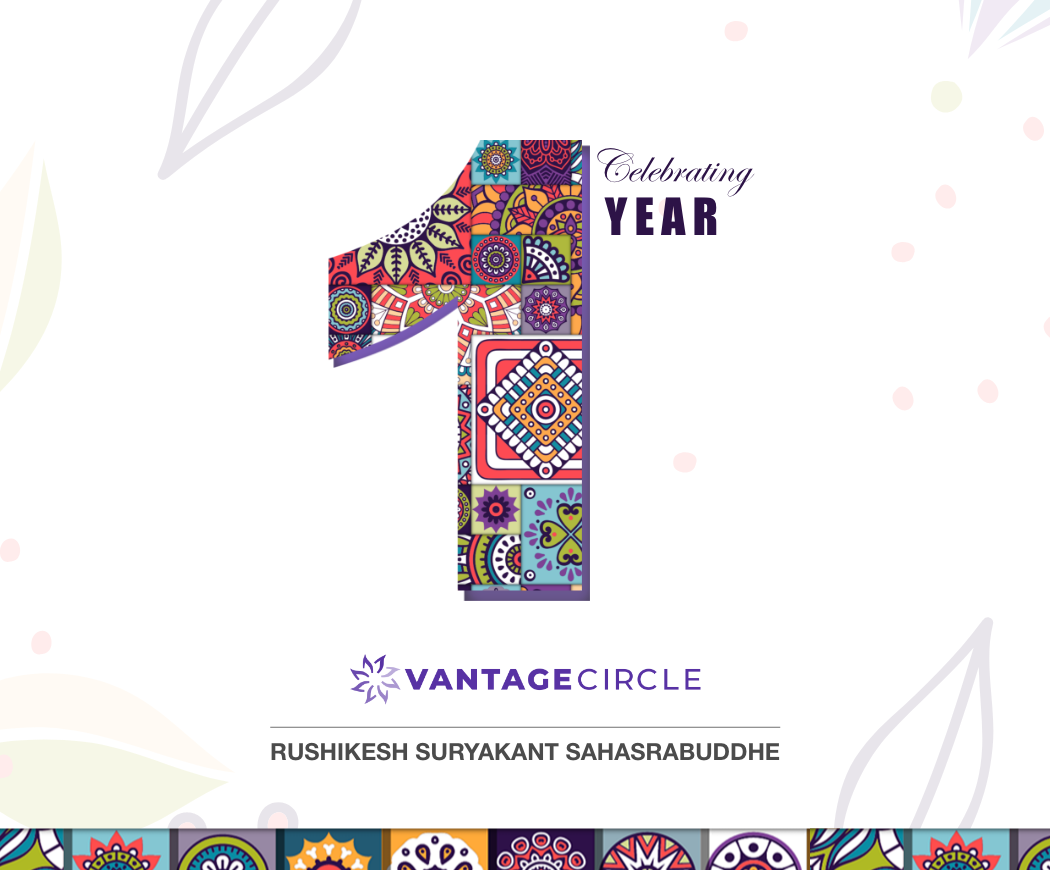
The Idea
Work anniversaries are a big thing. After all, when you have successfully dedicated year(s) of your life to helping the company reach pivotal milestones, you expect good things to happen on your work anniversaries.
But, while cakes, balloons, and lovely cards are nice touches, they often fall short of expressing just how much the employee has added value to the company's culture and bottom line.
That's why we here at Vantage Circle came up with a not-so-little feature that will entirely transform the way your employees feel during their individual work anniversaries. Here's introducing the Service Yearbook!
If You Are An HR Manager
The Service Yearbook, an AI-powered and automated Vantage Rewards feature, enables coworkers to collect, compile, and share memories of a team member before their work anniversary in the form of a personalized online yearbook.
Imagine receiving an amazing virtual collection of thoughtful messages from your colleagues and bosses, reminiscing about the highs and lows of your work life, and feeling all warm and fuzzy inside. It's like a trip down memory lane but with a personalized touch from the people you work with.
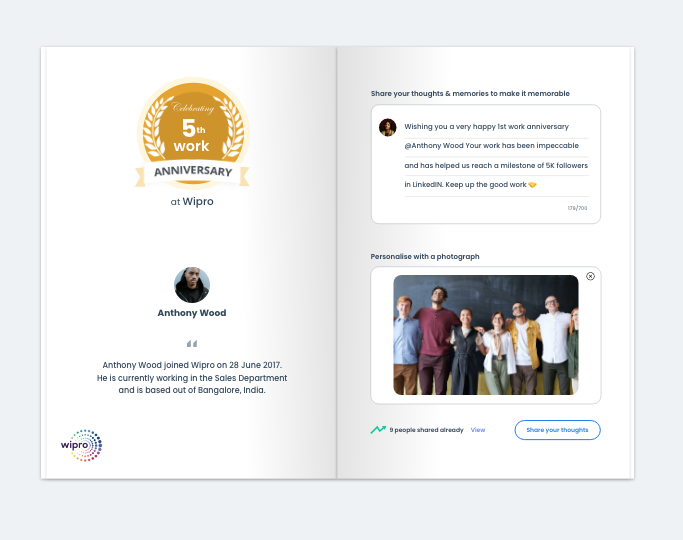
The employee will receive the Service Yearbook on the day of their work anniversary, allowing them to review and reflect on their years of service through messages shared by their peers and leaders.
Here is a quick peek explaining the fundamentals of how the Service Yearbook works:
If you want to learn more about how integrating the Service Yearbook can give your seasoned employees the morale boost they need, connect with us for a free demo.
If You Are An Employee
Your words have a greater impact than you realize. However, if the idea of recognizing someone in a public space makes your insides shrivel with anxiety, then the Service Yearbook is the ideal tool for you to express privately to peers how much you respect everything they do.
6. Cross-Departmental Recognition
The Idea
The problem with recognition is that it gets limited to people we are familiar with. While starting with practicing peer-to-peer recognition within your team is a good move, the problem arises when Team A doesn't acknowledge the help that they get from Team B.
Doing so might seem like a minor problem at first, but down the line, you get a bunch of teams that think they are better than every other team. Team unity does rise but at the cost of the overall imbalance of harmony among different teams.
That is why it is so crucial to account for cross-departmental recognition practices when planning for your organization's engagement goals.
If You Are An HR Manager
Take the recognition beyond your own department. For example, each department nominates another department to celebrate for a week. Celebrate with a virtual coffee break or happy hour.
If You Are An Employee
Take recognition beyond your department. Start with small steps. Saw the new amazing design that the UX Design team did on the new website? Publicly appreciate the team on your company's common communication channel.
7. "Catch Someone Doing Something Right"

The Idea
The inspiration behind this idea is NetApp's program called "Catch Someone Doing Something Right." Employees (both peers and managers) who see an employee going above and beyond reach out to the CEO, who personally calls and thanks the employee for their efforts.
NetApp's distinct culture is largely the result of the efforts of Tom Mendoza, the company's current Vice Chairman, who has been with the company since 1994.
"It's a simple and powerful concept: Any employee who sees others doing extraordinary things to help our company, customers, or partners simply has to reach out to me, and I will call that employee to thank them," explains Mendoza. "Such efforts include working the weekend to wrap up a project or devising a solution that makes a team more efficient."
If You Are An HR Manager
NetApp demonstrates that, while swanky perks are nice, what employees really want is to be seen and respected for their work.
A CEO approaching you and saying, "Great job!" strikes an emotional cord within you that connects you to the company's mission. When a person sees that their work is appreciated by the top dog, they want to stick around and be part of that future.
However, we understand that CEOs of large companies won't really have the time or bandwidth to pop up and congratulate everyone. So we kind of solved that problem with Vantage Rewards' Social Feed.
Think of a company-wide social media platform where anyone can appreciate virtually anyone else- and the whole company will be there to see it. That is basically what our Social Feed does, in a nutshell.
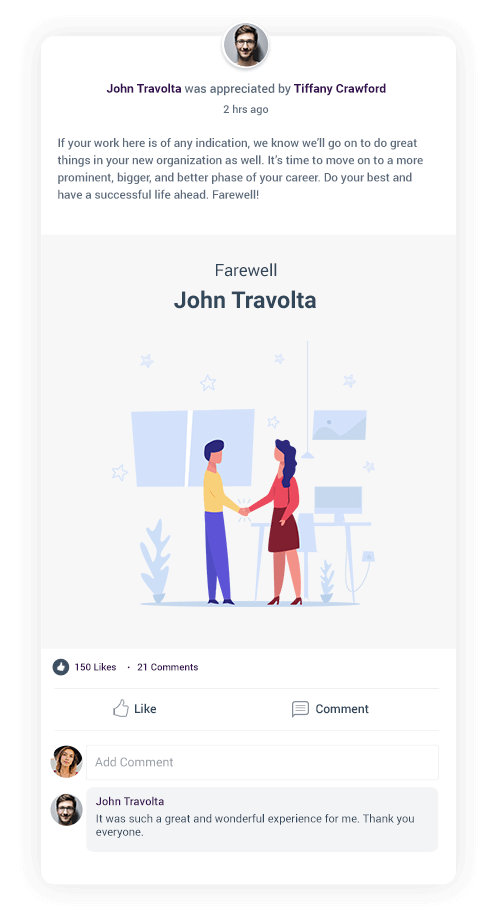
To make the deal sweeter, we have gamified the Social Feed to work, look, and feel like a real social networking platform. You can like, comment, and share meme-worthy gifs on appreciation posts and milestone occasions like birthdays, work anniversaries, or any big win.
Admins also get access to in-depth reports and data on how the Social Feed is being used by the employees.
To know more about how this handy Vantage Reward feature can be the perfect addition for your recognition strategy, get in touch with our team for a free demo.
If You Are An Employee
Don't reserve your appreciation for only your office BFFs. When people do great work, say so publicly. Utilize whatever communication medium your workplace uses, be it Slack or Skype, and laud the efforts put forward by your peer. We promise compliments from a near-stranger sound even sweeter.
8. Tag, You're It
The Idea
Take recognition beyond your own department or team. Our preferred method is to propose another team that has been a steadfast ally to us and dedicated an entire day (or week) to honoring those superstars.
If You Are An HR Manager
The contributions of cross-functional teams often get swept under the rug, mainly because the projects are brief or happen once in a blue moon. What this does is create a culture of appreciation but only within the teams themselves. This is an unspoken mistake you want to avoid and to get started, make this idea mandatory.
If You Are An Employee
Don't shy away from appreciating good work, even when you are unfamiliar with the other person. Leaving a nice message on the team communication app should not take more than 5 minutes and will definitely put a huge smile on the other person's face.
9. Cheesy Poem Contest
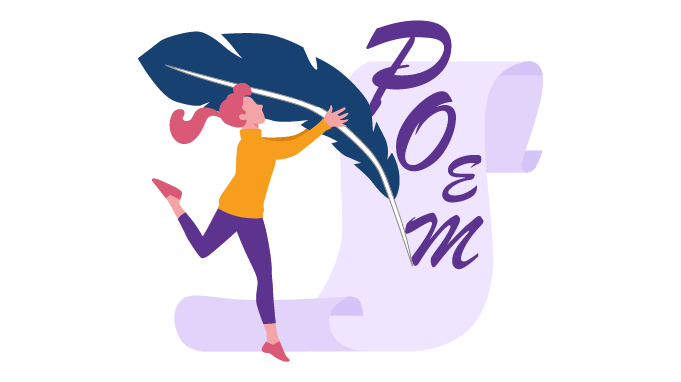
The Idea
Peer-to-peer recognition needn't always be about stiff handshakes and awkward "thank you." It can also be quite fun, like writing down an appreciative cheesy poem that can also turn out to be quite the icebreaker.
If You Are An HR Manager
If you are actually expecting an employee to spontaneously start reciting poetry, your people are far more adventurous than our team.
If not, we highly recommend hosting a Haiku Writing Contest where your employees compete to create the most sentimental (or absurd) poetry for that one coworker who makes their life immeasurably simpler.
Gamification and fun? Count us right in!
If You Are An Employee
Why send a generic thank-you note when you can write a moving haiku for the teammate who has been helping you cover your deadlines?
9. Vending Machine Run
The Idea
Even among the companies that do peer-to-peer recognition really well, Zappos stands out from the rest. Their motto of "doing more with less" is based on employees sharing low-cost, high-frequency rewards with each other.
Zappos employees can also earn "Zollars" (Zappos Dollars) that can be redeemed on company swag, donated to Zappos-partnered charities, or on movie tickets.
But, more than that, Zollars can also be awarded from one peer to another, along with a note of why they are being awarded. That is where Zappos succeeded in transforming recognition from being a top-down hierarchical practice into it being part of their company's core values.
If You Are An HR Manager
Assign a small reward budget to each employee so that they can give those points away as a token of appreciation when they notice their coworkers doing something exceptional.
Design this program in a way so that these reward points can be redeemed on the small things that do end up making a huge difference, such as snacks from the cafeteria or purchasing gift cards from the local Starbucks.
If You Are An Employee
This may sound like a broken record, but when you see someone on your team going above and beyond for their job (or the team), getting a coffee or chocolate from the vending machine every now and then is a really nice thing to do.
10. Virtual Wall Of Fame
The Idea
The "Wall Of Fame" is essentially a special board (physical or virtual) where the accomplishments and accolades of the company's top employees are prominently displayed.
If You Are An HR Manager
Create a physical or virtual recognition board where employees can share kudos with one another. "Pinning" recognition through public notes is an excellent way to raise awareness of the values you want to instill in your company while also boosting morale.
If You Are An Employee
Remember that authenticity and meaningfulness are essential when sharing a note of appreciation on your company's wall of fame. Instead of a generic "thank you," try framing your message to highlight what your peer has accomplished and how it has impacted you or your team.
11. Fun Feedback Friday
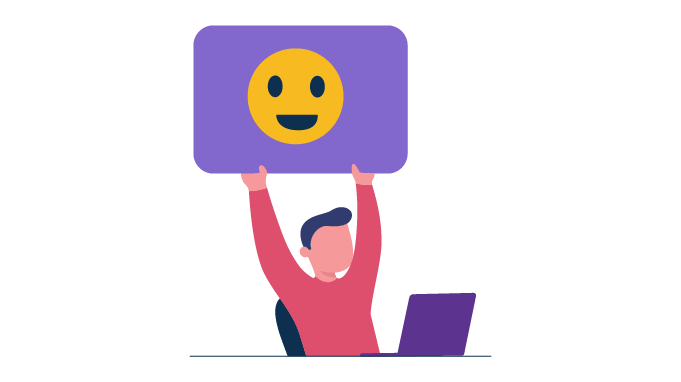
The Idea
Feedback doesn't have to be the elephant in the room that everyone shields away from. Mostly, it's negative feedback that people are terrified of. But when it comes to positive or constructive feedback, it is sought out and loved by everyone.
As the name implies, Fun Feedback Fridays are all about transforming your regular Fridays into mini sessions of back-and-forth conversations with the people in your team.
If You Are An HR Manager
- Set aside a specific day of the week, such as Friday, for employees to give each other recognition.
- Encourage employees to share their feedback and recognition with one another through a designated platform, such as an internal messaging system or a recognition program.
- Leverage a token, ticket, or card system that allows employees to earn swag bucks for receiving any peer's feedback. The reward points can be traded in for gifts such as a prime parking spot, PTO, or a sweet treat for their team.
- Measure the success of the program and continue to iterate and improve based on feedback from employees.
Do remember that you need to moderate such sessions actively. The given feedback should be constructive and not designed to hurt anyone's sentiment. The ideal scenario would be to hire a moderator who goes through every feedback before handing it over to the intended person.
If You Are An Employee
With positive feedback, the job becomes easy. But if it's negative feedback, you're looking to give; we recommend that you make it constructive.
12. Coffee Treats
The Idea
Peer-to-peer recognition can also be as simple as receiving your favorite brew as a thank-you for a task that others take for granted.
If You Are An HR Manager
Picture this: Every month, there is a "Free Coffee Day" where employees can buy a coffee for a colleague as a token of their appreciation using fictitious company money or points. Naturally, the company will foot the bill for the coffee, but we guarantee that your employees will eagerly anticipate this day.
If You Are An Employee
Even if your company does not have a reward or token system in place, stopping by a colleague's cubicle for a quick chat and bringing them a cup of coffee can always be the start of a potential new friendship.
13. LinkedIn Endorsements

The Idea
To those who are unaware, every LinkedIn user has the ability to publicly post an endorsement for anyone on their connection list, detailing why that person has been an important part of their career journey.
If You Are An HR Manager
Yes, you can post a LinkedIn endorsement for an employee, but since the focus here is on peer-to-peer recognition, the best thing you can do is to encourage your people to go ahead and do it.
If You Are An Employee
So, go ahead and let the (business) world know that your peer has been a rock for the group and the organization. In the meantime, you can share a thoughtful post on your LinkedIn feed and tag your colleague.
14. Golden Ticket Project
The Idea
The Golden Ticket Project, or the much easier GTP, was open to all pediatric residents at a pediatric residency program from October 2013 to July 2014. A digital system allowed residents to thank a colleague for any noteworthy behavior by giving them a "Golden Ticket."
Following the year-long initiative, it was discovered that the top two criteria for winning the Golden Tickets were "teamwork" and "positive attitude."
The results?
- Most residents (61%) either gave or received "Golden Tickets."
- Teamwork was recognized the most frequently, with 43% of all Golden Tickets mentioning it.
- 76% of employees wanted the program to continue. Of those, 49% 'agreed' or 'strongly agreed' that they were 'more aware of acts of kindness in the residency program because of the Golden Ticket Project.
If You Are An HR Manager
As an HR manager, you can take inspiration from the above idea and launching your own version of the Golden Ticket Project.
If You Are An Employee
Send this idea for peer appreciation to your HR manager ASAP and ask them whether it may be adopted in your own company since it has documented benefits. Even if they say "no," you can skip the "Golden Tickets" part and say "Great Job" when people make some remarkable achievements.
15. Social Superstar

The Idea
Okay. Since it isn't a peer-to-peer recognition idea in the traditional sense, this is technically cheating. In reality, though, this is just a way of recognizing that one employee who is thoughtful, empathetic, and humble enough to be the first to compliment someone else on a job well done.
If You Are An HR Manager
Those who recognize others deserve their own special brand of recognition. Appreciating such employees also drives the message that you value people who go out of their way to build connections and build others up. If there is an easy way to reinforce the fact that you take peer recognition seriously, it's this.
If You Are An Employee
Remember that team member that hypes everyone up? Chances are, they could use some encouraging words of their own. Remember that appreciation is a 360-degree factor that should not be limited to specific roles, responsibilities, or people.
Conclusion
So there you have it— peer recognition ideas that are sure to bring some fun and excitement to your workplace! Imagine your team members' faces lighting up as they receive a personalized shout-out or a small token of appreciation for their hard work.
But here's the thing: these ideas are only as good as you make them. Sure, you could read this blog post, nod your head in agreement, and move on with your day. Or, you could take action and actually implement these ideas in your workplace.
So, let's make a pact right here, right now, to commit to creating a culture of appreciation where everyone feels seen and valued. Now go forth and spread the love - your employees will thank you for it.
FAQs: Peer-to-peer Recognition Ideas
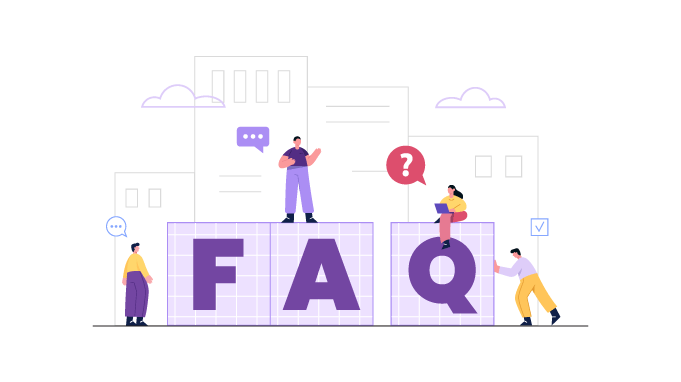
1. What is peer recognition?
Peer recognition is the formal or informal practice of acknowledging and appreciating the contributions and achievements of colleagues within an organization. It entails employees recognizing and appreciating the efforts of their colleagues without the involvement of management or HR. Peer recognition can boost employee morale and motivation by fostering an appreciation culture and a sense of belonging in the workplace.
2. How is peer-to-peer recognition different from traditional recognition programs?
| Criteria | Peer-to-Peer Recognition | Traditional Recognition Programs |
|---|---|---|
| Initiators | Recognition initiated by colleagues | Recognition initiated by managers or HR |
| Recipients | Peers recognize each other | Managers or HR recognize employees |
| Initiators | Recognition initiated by colleagues | Recognition initiated by managers or HR |
| Frequency | Spontaneous, frequent | Regular, periodic |
| Type of recognition | Informal or formal, personalized | Formal, standardized, tied to metrics |
| Process | Simple, organic, personalized | Structured, bureaucratic, standardized |
| Impact | Fosters a sense of community, enhances team spirit | Motivates performance, rewards results |
3. Why is peer-to-peer recognition important?
Peer-to-peer recognition is essential for building a culture of appreciation, collaboration, and camaraderie in the workplace. It is a powerful tool that empowers employees to recognize and celebrate each other's achievements and contributions without the need for top-down intervention or management oversight. Here are some reasons why peer-to-peer recognition is important:
Sparks joy and positivity: Peer recognition is a simple but effective way to spread joy and positivity in the workplace. It creates a virtuous cycle of gratitude and appreciation, where employees feel valued and motivated to perform their best.
Celebrates the everyday heroes: Peer recognition helps to shine a light on the unsung heroes in the workplace - those who consistently deliver outstanding results but may not receive formal recognition or rewards.
Unleashes the power of teamwork: Peer recognition fosters a sense of teamwork and collaboration as employees learn to appreciate and support each other's strengths and skills. This leads to a more cohesive and productive workplace where everyone is working towards a common goal.
Boosts engagement and motivation: Peer recognition is a powerful motivator, as it taps into the fundamental human need for recognition and validation. When employees feel appreciated and valued by their peers, they are more engaged and motivated to perform at their best.
Drives retention and loyalty: Peer recognition helps to create a positive and supportive work environment where employees feel a sense of belonging and connection. This, in turn, leads to higher retention rates and greater loyalty toward the company.
4. What is an example of peer recognition?
At a company's weekly "wins" celebration, an employee shares how a colleague's support and encouragement helped them achieve a breakthrough in a challenging project. Following the meeting, the employee surprises their colleague with a meaningful gift that reflects their interests and passions, as well as a note of gratitude and appreciation.
This kind of personalized and meaningful peer recognition can foster a deeper sense of connection and trust between employees and create a more positive and supportive work environment.
5. What are the criteria for peer recognition?
Recognizing your coworkers for their excellent achievements and efforts can be a powerful approach to building a positive and productive work culture. To get the most out of peer recognition, keep the following criteria in mind:
- Impactful: The employee's activities or contributions should have had a major impact on the team, department, or company. Consider the ripple impact of their efforts and how it has helped others.
- Above and Beyond: The employee should have gone above and beyond their ordinary duties or obligations, demonstrating remarkable effort or dedication. This could include taking on extra tasks, volunteering for extra work, or coming up with creative solutions.
- Consistent: The employee's behaviors or contributions need to have remained consistent over time. This demonstrates their dedication, dependability, and persistence in their efforts.
- Values-Aligned: The employee's contributions or activities ought to be in line with the mission, vision, and values of the business. This implies that they should work to further the organization's broader objectives and goals.
- Peer-Endorsed: Peer appreciation should be initiated and supported by colleagues who have firsthand knowledge of the employee's accomplishments or activities. This increases the recognition's credibility and sincerity, making it more meaningful to the recipient.

















